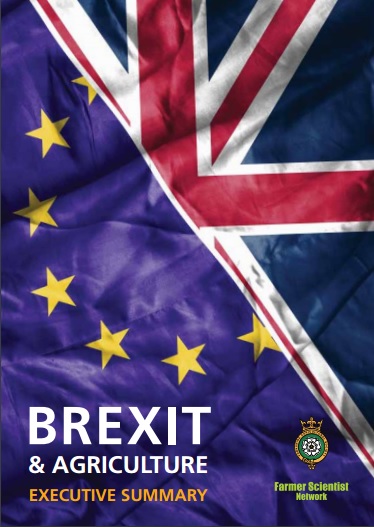In June 2016, the UK Government will hold a public referendum for the people to decide whether or not Britain should exit the European Union. This contentious issue, popularly known as “Brexit”, has even divided the governing political party, with key parliamentary figures standing on either side of the debate.
There are many complex political issues for the UK to consider ahead of this referendum. One of these issues is: “what would be the consequences for UK agriculture if Britain were to leave the EU?” Professor Wyn Grant, a member of the Farmer–Scientist Network in the UK, tells us about a new report asking this very question.
Brexit and agriculture
by Wyn Grant
The Farmer–Scientist Network was set up by the Yorkshire Agricultural Society (UK) to facilitate practical cooperation between farmers and academics on the challenges facing agriculture. The Network felt there was a need to produce an assessment of the possible consequences of Brexit for agriculture. A working party was established, made up of leading experts on the EU’s Common Agricultural Policy and farmer members. I chaired this working party, and we produced what we hope is a comprehensive report, available here: http://yas.co.uk/charitable-activities/farmer-scientist-network/brexit.
 In producing the Brexit report, one of our objectives was to provide information that farmers and others concerned with agriculture could use to question politicians during the referendum campaign. We also felt that agriculture and food had not been given sufficient attention during the negotiations and subsequent discussions. Should Brexit occur, our report draws attention to the issues that would have to be considered in exit negotiations.
In producing the Brexit report, one of our objectives was to provide information that farmers and others concerned with agriculture could use to question politicians during the referendum campaign. We also felt that agriculture and food had not been given sufficient attention during the negotiations and subsequent discussions. Should Brexit occur, our report draws attention to the issues that would have to be considered in exit negotiations.
The ins and outs of leaving
When evaluating the implications of Brexit for agriculture, we expected there would be complexities and uncertainties, but these were, in fact, greater than we anticipated. One reason for this is that, although the Lisbon Treaty on which the EU is founded makes provision for Member States to leave the EU under ‘Article 50’, none have ever done so before. It is difficult to know in advance how Britain’s exit would proceed, but it would almost certainly be necessary to use the entire two-year negotiating window provided for in the Treaty. Another complication is that the UK Government has not undertaken any formal contingency planning for exit, so it is difficult to know what a future domestic agricultural policy would look like.
In the event of Brexit taking place, the Farmer–Scientist Network feels that an optimal arrangement for the UK would be to establish a free trade area with the rest of the EU, with tariff-free access for UK farm products to the internal market. However, we don’t think the EU would want to give too generous a deal for fear of encouraging other member states to think about the benefits of exit.
Subsidies
Currently, two ‘pillars’ of financial subsidy are awarded to stakeholders in EU agriculture. We believe that the existing ‘Pillar 1’ subsidies that are given to EU farmers would be vulnerable after Brexit. This is an important issue, as for many farmers these subsidies make the difference between making a profit and running at a loss. Supporters of Brexit argue that the savings made from contributions to the EU budget would more than allow for subsidies to continue to be paid at the existing level. However, this overlooks the fact that the UK Treasury has for a long time targeted these subsidies as “market distorting”, and in the current climate of austerity in the UK, they could be at risk of being phased out as a means to reduce public expenditure.
We did, however, think that the ‘Pillar 2’ subsidies directed at agri-environmental and rural development objectives would be continued in some form. This is in part because they are embedded in contracts that continue beyond 2020, and because they have a coalition of domestic support from outside the industry from environmental and conservation lobbies.
Regulation
Some farmers resent what they see as excessive regulation emanating from Brussels. However, we think it is unlikely that many of these controls would be dropped or relaxed following Brexit. There are good reasons for regulations covering such areas as water pollution, pesticide use and animal welfare that have nothing to do with membership of the EU. Domestic support for such regulations would continue from environmental, conservation, public health, animal welfare and consumer organisations.
Some farmers hope that plant protection products that have been banned under EU regulations could be used after Brexit. However, there would still be domestic pressure to regulate these products and manufacturers might be unwilling to produce them just for the UK market.
Negotiation and trade
The UK at present negotiates in the World Trade Organisation (WTO) as a part of an EU bloc which provides additional leverage against powerful countries such as the United States. The agreements that the EU has with ‘third’ countries (those outside of Europe) would have to be renegotiated on a single country basis. Supporters of Brexit are confident that this task could be completed within two years. However, given that the UK has relied on the negotiating resources of the European Commission, it does not have many international trade diplomats and the process could take considerably longer.
Migrant labour
The horticulture industry in the UK is substantially dependent on migrant labour from elsewhere in the EU. This could not easily be replaced with domestic labour. It would be necessary to try and negotiate a new version of the Seasonal Agricultural Workers Scheme (SAWS) – a scheme (redundant since 2013) that was established to allow migrant workers from certain countries outside of the EU to work in UK agriculture – to ensure that the sector would have the labour it needs to function.
Conclusions
Being part of a larger political community gives British farmers some political cover from countries where farming makes up a large share of GDP or has strong cultural roots. The Farmer–Scientist Network concluded that it was difficult to see Brexit as beneficial to UK agriculture. However, we also emphasised that there are broader considerations about UK membership that needed to be weighed in any voting decision.







